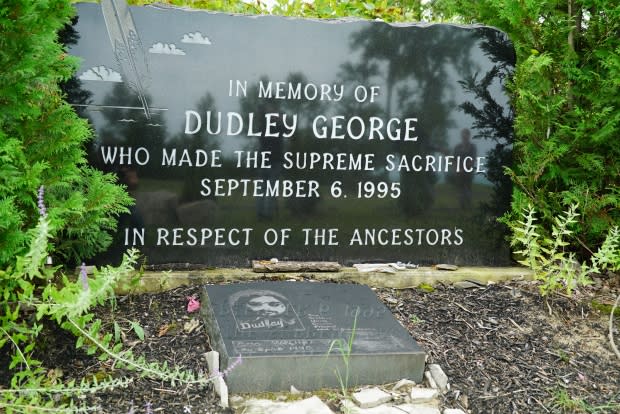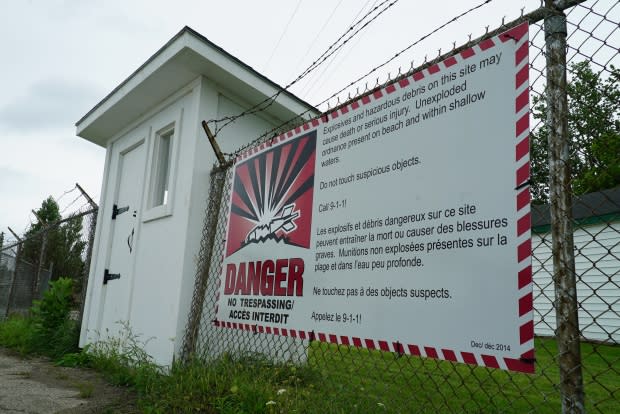Quarter century after killing of Dudley George, Ontario provincial park land returned to First Nation
The federal and Ontario governments have returned Ipperwash Provincial Park to Kettle and Stony Point First Nation, the end of what's called an "addition to reserve" process.
But part of the land Dudley George died trying to get back 25 years ago, known as Camp Ipperwash, is still technically under the control of the federal government. It's also littered with unexploded ordnances and has to be decontaminated.
"The return of the former provincial park lands is an important legal indicator for our ancestors and our future generations that we're home again and the land is legally ours," said Kettle and Stony Point Chief Jason Henry in a statement.
"The return of this portion of the lands is but a small portion of what was lost and although the process is not perfect, it gives hope that in the future, we may see the full return of Aazhoodena." Aazhoodena refers to Stony Point.
Today's announcement adds 45.992 hectares (113.629 acres) of land to the Chippewas of Kettle and Stony Point First Nation, near Sarnia, Ont., on the banks of Lake Huron.
Henry called the return of the land "bittersweet," because it has to be done under the Indian Act, a colonial piece of legislation that has divided his people.
The province had to transfer the provincial park lands to the Government of Canada, which then formally transferred it to the First Nation. The province announced its intention to give back the park in 2007.
George was 38 years old in 1995 when he occupied the provincial park, which contains ancient burial grounds, with others from Stony Point. They had previously taken over the Camp Ipperwash military base, right next to the park, demanding the federal government return it as it had promised when it seized the land in 1942. George was shot during a confrontation with Ontario Provincial Police (OPP) on Sept. 6, 1995.
The Department of National Defence is clearing the Camp Ipperwash land and has an agreement with the First Nation, which will see it given back in parcels as it is cleared. The work is only possible in the summer months. As of 2019, DND has found and cleared 116 munitions from the site. Defence also said it will take another 25 years to decontaminate that land.
"The Chippewas of Kettle and Stony Point First Nation would like to acknowledge the formal return of a portion [of] the lands we call Aazhoodena [Stony Point]. As a nation, we have always known about the significance of Aazhoodena and the lands there were reclaimed in 1995," Henry said in the statement.
"It is also important that we honour the memory of Dudley George today, who made the supreme sacrifice in respect of the ancestors and all of those who have dedicated their lives to the return of our lands."

'Key to reconciliation'
Henry said he doesn't think the provincial park lands, which still have beaches accessed by the public, will be developed because of the presence of burial grounds. Instead, they will be used for recreational and spiritual purposes, he said.
Additions to reserves are key to advancing reconciliation with Indigenous communities across Canada and create the foundation for social development and economic growth that can generate benefits for Indigenous people and all Canadians, the federal government said in a statement.
"The return of these lands is an important step in the history of Canada, as today we are able to right past wrongs," said Carolyn Bennett, federal minister of Crown-Indigenous Relations.
LISTEN | Remembering Dudley George:
The Chippewas of Kettle and Stony Point were once two distinct communities, one living in Kettle Point and the other in nearby Stony Point. In 1942, the federal government seized Stony Point and relocated families living there to Kettle Point, where they did not feel at home.
The two points are separated by what used to be the provincial park.

"In 1995, Dudley George tragically died while seeking to reclaim these lands for his people. This formal return of land is a reflection of Dudley's legacy and the years of advocacy from Chief Henry, his council and members of the Chippewas of Kettle & Stony Point First Nation," said Mark Miller, federal Indigenous Services minister.
Greg Rickford, provincial minister for Indigenous Affairs, said he is proud of the land transfer.
"Our government is committed to taking real action to advance reconciliation and strengthen relationships with Indigenous partners for the benefit of First Nations across the province," he said in a statement.

